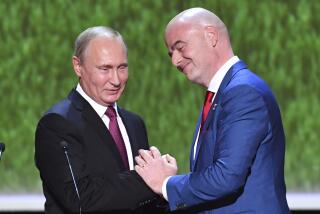Soviet Sports: Breakdown of the Big Red Machine
- Share via
MOSCOW — Two months before the start of the 1992 Winter Olympic Games, the once-powerful Soviet sports system is broke, reeling from the loss of stars and torn by political turmoil.
Political changes that shattered the Soviet empire and economy has taken a toll on sports. This month, it led to the end of the government agency that exerted rigid Communist control over generations of champions like gymnast Olga Korbut, pole vaulter Sergei Bubka, basketball player Arvidas Sabonis and figure skaters Ludmilla Beloussova and Oleg Protopopov.
“We are living through a difficult period,” said Vitaly Smirnov, chairman of the Soviet Olympic Committee.
But Smirnov predicts the Soviet Union will win more medals at the 1992 Olympics than any other country, as they have in the past. Even if newly reunited Germany wins more medals in Albertville, the Soviets will run away with the Summer Games in Barcelona, Smirnov said.
Although the newly independent Baltic states of Estonia, Latvia and Lithuania will field individual teams, the other 12 Soviet republics agreed in November to send a united team. But they have not yet agreed on a team flag, anthem or uniforms, and can’t decide what to do after 1992.
The burly Smirnov acknowledged that the nation’s future as a sports superpower rests on a lot of humbling “ifs.”
“If we can keep a unified team, if we can feed, clothe and equip the team and get it to the contests -- then we will stay No. 1,” he said.
Among the problems caused by the political collapse of the country are a loss of government funding and the so-called “brawn drain.” Many Baltic athletes have left to compete for their homelands, and other top stars have taken high-paying contracts in the West.
Soviet athletics also lacks an organizing structure after the abolition this month of the government sports agency, Gossport. Russian President Boris Yeltsin sealed the agency’s fate when he cut funding for more than 70 Soviet ministries and departments.
Gossport was hated by athletes for its intrusion in their lives. Still, it paid salaries to 23,000 athletes and 1,200 coaches, funded training camps and sports schools, and handled visas, transport and medical services for Olympic teams. No provision was made to transfer any of Gossport’s functions.
The pill is a bitter one for a people whose leaders until recently claimed that athletic victories proved Communism’s superiority. Sports was a matter of national prestige and received top funding, with stunning results.
Since the Soviet Union started competing in the Olympics in 1952, it has won 1,212 medals, more than any other country during that period. The United States has won more medals -- 1,904 in all -- but has competed since 1896.
For several years before the August coup that ended Communist authority in the Kremlin, the Baltics, Georgia and other secessionist republics threatened to bar their athletes from Soviet teams.
But the botched putsch sped the transfer of power from the central government to the republics, all of which won more autonomy. The Baltic states regained full independence and were recognized by foreign governments and the International Olympic Committee.
“The Baltics are a serious loss,” said Viktor Mamatov, who was Gossport’s top official in charge of winter Olympic teams. He cited biathlon expert Allar Levandi, who will compete for his native Estonia.
“This was one of the gold medals we counted on,” Mamatov said.
Soviet basketball was devastated, losing four starting players from the 1988 gold medal Olympic team. The four players will compete for their own Baltic teams. Three were Lithuanians: center Arvidas Sabonis and forwards Sharunas Marculionis and Rimas Kortenaitis. The fourth was Estonian point guard Tiit Sokk.
Soviet head basketball coach Yuri Selikhov, who was the assistant coach during the 1988 Seoul Olympics, dreads pitting his inexperienced players against the Lithuanian veterans.
“Lithuania will be a pretty tough team in Barcelona,” he said.
Officials profess less long-term concern for the loss of individual talent than the collapse of government funding.
Previously, said Smirnov, Soviet sports teams were “totally parasitic,” dependent on a government willing to pay any price for a winner.
“We knew every sports organization would be funded from year to year
But economic crisis dried up most of these subsidies. Gossport, based in its gray, four-story headquarters near Moscow’s Lenin Stadium, increasingly came to be regarded as an irrelevant body of bureaucrats.
Real power has shifted to federations for each sport, which are trying to raise money from sponsors. The federations no longer need government approval to send athletes to contests abroad.
Yeltsin and leaders in other republics further weakened Gossport after the putsch by declaring that their republics were taking over all Soviet government property, including sports facilities.
“Russia and the republics used the putsch to grab everything for themselves,” said Gossport’s Mamatov.
But Gossport was losing its grip even before the coup. Its annual budget of 150 million rubles was woefully inadequate to meet rising costs. Medicine, equipment and trips abroad require foreign currency that the government stopped providing.
Gossport also lost a key source of foreign currency three years ago when such athletes as tennis players Andrei Chesnokov and Natalia Zvereva began refusing to hand over their prize money to the state.
This has meant belt-tightening. The Soviet national swim team competed in only two foreign meets this year instead of the usual five.
Selikhov, the basketball coach, said his training camp no longer feeds his team the best cuts of meat. His players said they have noticed.
Soviet sports may be in crisis, but athletes, coaches and sports officials say it is not dead.
“We have these fanatic coaches, who discover gifted athletes and teach them to love sports -- to love basketball, for example,” said Sergei Basarevich, star point guard of the Olympic basketball team.
Even Leonid Drachevsky, Gossport’s second highest-ranking official and the man assigned to preside over its liquidation, predicts Soviet sports will endure.
“It’s unthinkable that we would let Soviet sports die,” said Drachevsky. “It would be like letting theater, literature, or music die.
“Ours is a big country of 300 million people with enormous potential, a tradition of sports, and people who do it well.”
More to Read
Go beyond the scoreboard
Get the latest on L.A.'s teams in the daily Sports Report newsletter.
You may occasionally receive promotional content from the Los Angeles Times.







